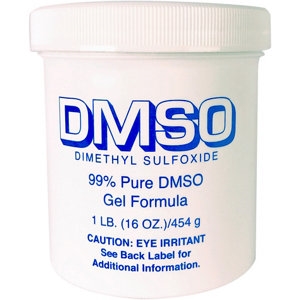Gel DMSO
Topical Application:
Apply a thin layer of the gel to the affected area once or twice daily, depending on the veterinarian’s recommendation. Gel DMSO
Massage gently into the skin, ensuring it is evenly distributed.
Make sure the area is clean before applying the gel, as DMSO will carry any contaminants (dirt, bacteria, etc.) into the tissues.
Dilution: In some cases, DMSO may need to be diluted before application, especially for sensitive animals or if being applied over large areas. Always follow your veterinarian’s instructions for diluting DMSO.
Precautions for Application:
Wear gloves when applying DMSO gel to avoid it being absorbed through your skin.
Do not apply to broken or irritated skin unless specifically instructed by a veterinarian.
5. Precautions and Side Effects:
While It is generally safe, it is important to use it correctly to avoid side effects:
Skin Irritation: DMSO can cause redness, irritation, or burning at the application site, particularly if used in high concentrations or on sensitive skin. Always monitor the area for any signs of adverse reactions.
Odor: One of the most common side effects is the strong garlic-like odor that DMSO emits, which can be noticeable on both the animal and the handler. This odor is harmless but can be unpleasant.
Tissue Irritation: Overuse or applying too much DMSO can cause skin irritation or burning.
Allergic Reactions: Some animals may have an allergic reaction to DMSO. Signs include swelling, difficulty breathing, or hives. If these occur, discontinue use and consult a veterinarian immediately.
Absorption of Contaminants: Because DMSO can carry substances through the skin, ensure the area is clean before applying the gel to avoid introducing harmful substances into the body.
Safety Considerations:
Veterinary Supervision: Always consult a veterinarian before using DMSO on your horse or dog to ensure it is safe and appropriate for their condition.
Avoid Contact with Eyes and Mucous Membranes: DMSO can cause irritation if it gets into the eyes, nose, or mouth. If this happens, rinse thoroughly with water.
Not for Use on Open Wounds: Do not apply DMSO gel to open wounds unless explicitly directed by a veterinarian.
7. Potential Drug Interactions:
DMSO gel may enhance the absorption of other medications, which can be beneficial but also risky if it increases the potency of certain drugs. Always inform your veterinarian if your horse or dog is on any other medications before starting DMSO.
Handling DMSO Gel:
Wear Gloves: Always wear gloves when handling DMSO to avoid it being absorbed through your own skin.
Clean Application Site: The application site should be thoroughly cleaned to prevent the absorption of contaminants or other substances along with the DMSO.
Where to Buy DMSO Gel:
DMSO gel is available through veterinary supply stores, online pet pharmacies, and some general pharmacies that carry veterinary products. Ensure you are purchasing from a reputable source to guarantee product quality and safety.
Legal Considerations:
Use in Competition: If you are using DMSO on a horse involved in competitive equine sports, be aware of the regulations regarding its use, as DMSO may have withdrawal periods before competition. Always check the specific rules of the sport’s governing body to avoid disqualification.
Summary:
DMSO Gel is a versatile treatment used in veterinary medicine for both horses and dogs. It is primarily used for its anti-inflammatory and pain-relieving properties, making it ideal for conditions like arthritis, tendonitis, laminitis, and soft tissue injuries.
DMSO gel is easily applied topically and can carry other medications deep into tissues, enhancing their effectiveness. However, it must be used with care to avoid side effects such as skin irritation and contamination. Always follow veterinary guidance when using DMSO gel to ensure its safe and effective use.
Gel DMSO
Itl is a form of Dimethyl Sulfoxide (DMSO) that is commonly used in veterinary medicine for both horses and dogs to relieve pain, reduce inflammation, and promote healing. DMSO is a versatile product with strong anti-inflammatory, analgesic, and tissue-penetrating properties, making it a popular treatment for various musculoskeletal issues.
What is DMSO Gel?
DMSO Gel is a topical formulation of Dimethyl Sulfoxide, designed for ease of application on the skin. The gel form allows it to stay in place longer, making it easier to treat localized areas of pain or inflammation. DMSO’s ability to penetrate the skin and carry other substances deep into tissues makes it especially effective for treating conditions involving muscles, joints, and soft tissues.
How Does DMSO Gel Work?
Anti-inflammatory Action: DMSO inhibits the formation of inflammatory mediators, reducing inflammation in the affected areas.
Pain Relief: It acts as an analgesic by interfering with pain signal transmission in nerves, providing pain relief for conditions like arthritis, tendonitis, and muscle strains.
Transdermal Carrier: DMSO can penetrate the skin and carry other medications (like corticosteroids, antibiotics, or NSAIDs) into tissues, enhancing their effectiveness.
Antioxidant Properties: It scavenges free radicals, which are harmful molecules that cause oxidative stress and inflammation, promoting healing and reducing tissue damage.
Uses of DMSO Gel in Horses and Dogs
DMSO Gel is widely used for treating various conditions in both horses and dogs:
For Horses:
Joint Inflammation: DMSO gel is often applied to joints affected by arthritis, osteoarthritis, or synovitis to reduce inflammation and relieve pain.
Tendon and Ligament Injuries: It is used to treat soft tissue injuries like tendonitis and desmitis, reducing swelling and speeding up the healing process.
Laminitis: DMSO is commonly applied to reduce the inflammation associated with laminitis, a condition that affects the hooves.
Muscle Soreness: DMSO gel is used on muscles after exercise or injury to reduce soreness and stiffness, improving recovery time.
Swelling and Edema: It helps to reduce fluid buildup and swelling in tissues, particularly after injuries or surgery.
For Dogs:
Arthritis: DMSO is applied to inflamed joints in dogs suffering from arthritis or degenerative joint disease to reduce pain and improve mobility.
Intervertebral Disc Disease: For dogs with spinal problems, DMSO can be used to reduce inflammation and pain in the affected area.
Soft Tissue Injuries: Dogs with muscle strains, sprains, or injuries to ligaments can benefit from DMSO gel for faster recovery.
Wound Healing: DMSO promotes healing and reduces swelling in wounds or surgical sites.
Dosage and Application of DMSO Gel:
The application and dosage depend on the condition being treated and the animal’s size. General guidelines include:




Reviews
There are no reviews yet.